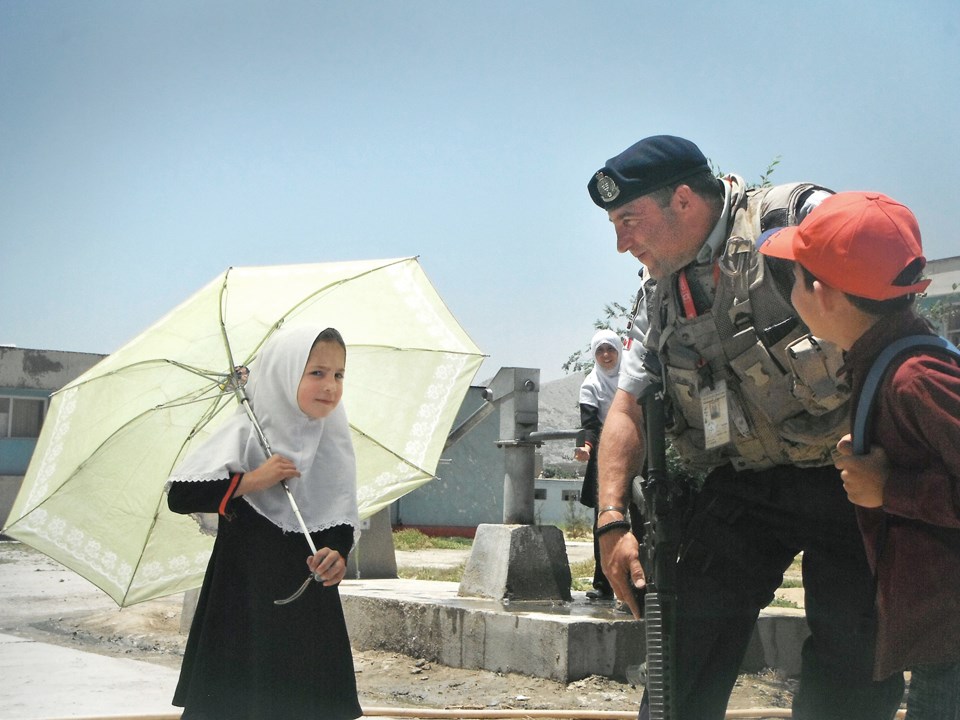During a year with NATO forces in Afghanistan, Burnaby North grad Tony Zanatta got to know a group of local kids aged six to 13 who used to hang around and sell trinkets or scarves to coalition soldiers moving between the camps.
One of his favourites was a girl of about 10 who knew a sentence or two in about six different languages – just enough to sell her wares. He still has a bracelet he got from her before she was killed, along with five other kids and four adults, by a 15-year-old on a bicycle with a suicide vest.
Zanatta was just around the corner from the blast.
“It’s not like on TV where people lie there looking serene with a little blood on them,” Zanatta told the NOW. “There’s nothing left of them, and they’re kids.”
Zanatta, a 31-year retired Vancouver police officer, was at his alma mater last Thursday for a Remembrance Day talk.
“I don’t say war is good; I don’t say war is bad,” he said. “I say it’s real, basically. I remind them that it’s not just pictures from World War 1 or World War 2 that they don’t relate to. I tell them it’s not a video game. I give them a bunch of information to think about and then I leave it to them.”
How do kids respond to what he has to say?
“With silence,” Zanatta said, “which, according to all my friends who are teachers, is the most phenomenal feedback you can ever get. They’re quiet for the 20 minutes that I talk.”
For some audience members, though, the presentation is personal.
“I had two girls come up to me; they were Afghan,” Zanatta said. “They had refugeed with their families about four years before and the one girl was crying. She comes up, she gives me a hug and she says, ‘Thank you very much. I keep telling my friends what it’s like, but they never really believe me.’ We had a great little talk.”
Zanatta was a VPD officer on secondment to the RCMP which took part in a NATO mission to mentor and advise the Afghan National Police. He spent most of his year in Afghanistan in Kabul.
His school presentations came about in 2013, shortly after he came back. He had complained to a high school vice principal friend that the country seemed to have forgotten about the war.
“Most Canadians didn’t really appreciate at the time that we had been at war for 10 years and how many Canadians had died and all the sort of things that go with it,” Zanatta said, “and every Remembrance Day ceremony is about World War 1, World War 2 and maybe a picture of three Americans in a Humvee.”
His friend suggested he do a Remembrance Day talk.
But Zanatta didn’t want to just lecture students, so he asked his friends’ teenaged kids what kinds of things they’d want to hear him talk about.
The result is a series of questions and answers that tell the story of his tours in Afghanistan.
“Mostly it’s observations of war, what it’s like to be in Afghanistan, what the country itself is like, what it’s like to live in an environment where the time change is 400 years,” Zanatta said.
One of the questions he gets asked a lot is why he volunteered.
It was a personal challenge as well as a chance to serve his country, he said.
“The third reason was that my life here was really messed up, and I was kind of running away.”
Even coming back alive and physically uninjured though, he paid a price for going.
“As the saying goes, you cannot unsee shit,” he said. “I suffered a bit when I came home, PTSD, not so much from my year in Afghanistan as my year in Afghanistan on top of 31 years of policing.”
Questions about whether he’s glad he went are met with a mixed response.
“I’m not saying it was good or bad,” he said. “I learned a lot. I learned a lot about myself. I learned a lot about that part of the world and fundamentalist culture and all those sort of things … On one hand, it shows you the strength and the will of people to survive in just an evil atmosphere. Little girls still go to school every day. But on the other hand, you see the terror and the brutality. There are high negatives.”
Because it comes from the heart, Zanatta said his presentation isn’t an easy one to give, and after four years of sharing his experiences with Canadian teens, the Burnaby North talk will be his last.
“Every piece of our life we have to put behind us at different times, and it’s time to put this piece behind,” he said. “You gotta move forward.”



